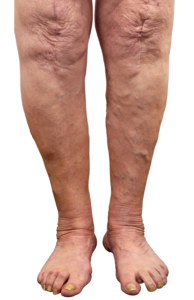
It’s a fair question—and a common one.
While it’s true that varicose veins can recur, that doesn’t mean treatment is pointless. Here’s why treatment still plays an important role.
Yes, Recurrence Can Happen
Varicose veins are part of a broader condition called chronic venous insufficiency, which means the underlying problem—faulty or weakened vein valves—can affect other veins over time.
Recurrence may happen due to:
Progression of vein disease
New veins becoming incompetent
Incomplete or inadequate earlier treatment
Natural factors like aging, pregnancy, or lifestyle
Why Treat Them Anyway?
Even though recurrence is possible, there are solid reasons to treat varicose veins:
Relief from symptoms: Pain, heaviness, swelling, and cramps often improve dramatically after treatment.
Prevent complications: Untreated varicose veins can lead to skin discoloration, ulcers, bleeding, or clot formation (thrombophlebitis).
Improved quality of life: Walking, standing, and sleeping become more comfortable.
Aesthetic confidence: For many, varicose veins are also a cosmetic concern—and treatment improves self-esteem.
Managing the Condition Long-Term
Think of varicose veins like high blood pressure or diabetes. You may not “cure” the underlying tendency, but you manage it effectively. Treatment addresses current problems and helps you maintain better vein health going forward.
Common treatments include:
Minimally invasive options like laser ablation or foam sclerotherapy
Wearing compression stockings
Lifestyle changes (exercise, leg elevation, weight management)
Final Thoughts
Yes, varicose veins can return—but treating them is still worth it. The goal is not only cosmetic but also functional: to reduce symptoms, avoid complications, and improve your day-to-day life.
If you’re hesitant because of fear of recurrence, talk to a vascular specialist. A personalized treatment and prevention plan can make a big difference in your long-term comfort and confidence.
